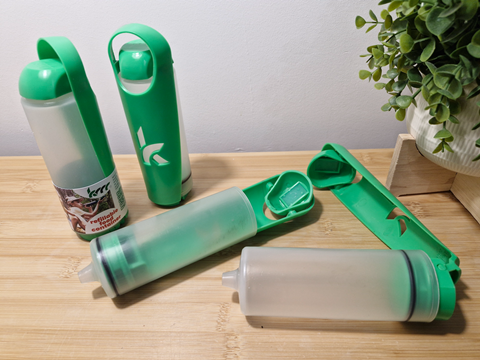
Koor aims to package edible and non-food products in a refillable bottle with a syringe-like refill mechanism and replaceable parts; it is intended for use at home, in schools or workplaces, and in aged care environments, among other settings.
Brisbane-based industrial engineer Jean-Francois Roiron created the bottle in response to his frustration with single-use yoghurt pouches and their price. Koor is instead made from food-grade polypropylene to ensure its durability, reusability, and ease of cleaning.
It is designed to emulate the features of a syringe, with users pulling the plunger to refill the dispenser, while the container itself is compact and easy to carry due to its handle. Its cap is said to close and seal in the space of a second to secure and protect the tip.
Every part of the bottle can be replaced, which is hoped to incentivize consumers to repair their product instead of replacing it.
Koor is FDA-certified and intended for food and non-food products with a viscous texture; this includes yoghurt, honey, tomato sauce, soups, purees, hand cream, suncream, glue, paint, and grease. The bottles can therefore be used at home, in schools, or at workshops, sporting events, campsites, and more.
Users with motor issues, dysphagia, sensory processing disorder, and other disabilities are set to benefit from Koor, as it is believed to enable independent and comfortable eating at the consumer’s own pace. As such, nurses are expected to save time if they introduce the bottle into aged care environments.
In its current form, Koor received two GOLD Awards at the Australasian Packaging Innovation & Design Awards 2024. Now a new range of containers is in development to make the bottles more refillable, including a small, fridge-sized container with a port for manual refill; and a larger container for bulk sections and automatic refill stations.
These solutions hope to completely negate the need for single-use packaging, instead allowing suppliers to exchange and reuse containers. An automatic station would reportedly recharge Koors ‘in seconds’ without requiring extensive service or cleaning.
Roiron highlights that food risks must be analyzed and mitigated when it comes to the refill process, but that the process is currently available for non-food products.
He invites anyone interested in becoming an industrial partner, or any distributors or shops willing to run pilots, to visit koor.life or contact hello@koor.life.
Another reusable bottle was unveiled by Berry Global and Aquafigure last summer. This one sought to cut down on waste by selling 3D artwork cards, which could be interchanged to customize the bottle at will – a solution also hoped to appeal to younger consumers and keep up with evolving trends.
Big brands are also embracing refill for various household essentials. Ocado Retail has piloted a reusable packaging scheme for basmati rice and penne pasta in a bid to save up to five single-use plastic packs per vessel; this has since extended to include liquid detergent and fabric softener.
If you liked this story, you might also enjoy:
The ultimate guide to the Packaging and Packaging Waste Regulation in 2024
How are the top brands progressing on packaging sustainability?
Sustainable Innovation Report 2024: Current trends and future priorities
Everything you need to know about global plastic sustainability regulation














No comments yet